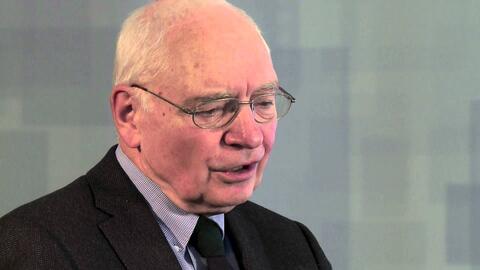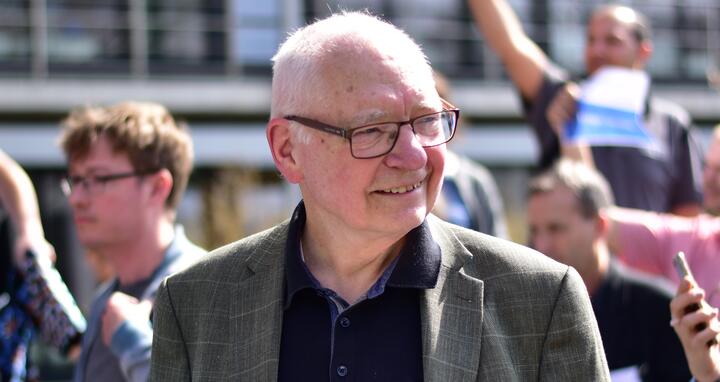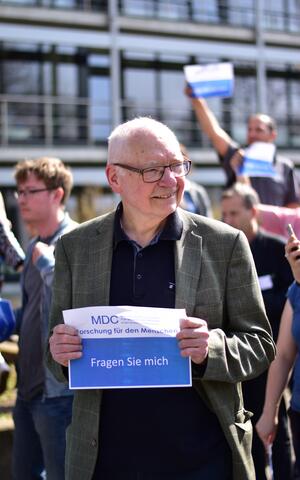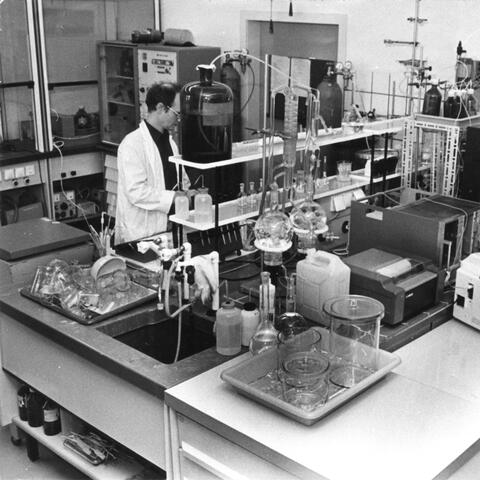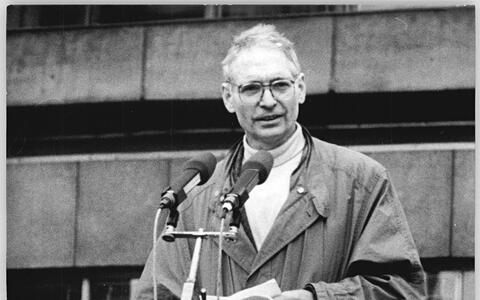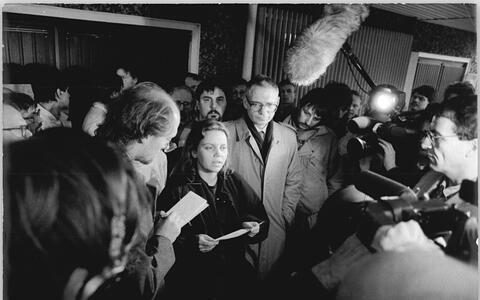📺 For the love of freedom
Potsdamer Platz was sprawled out before them, vast and desolate. Overground trains weren’t stopping there anymore, and the underground station was also closed. It was the morning of August 13, 1961. Ruptured paving and piled-up ramparts already formed a line where, just a short while later, the Berlin Wall would stand, separating the east and west of the city. Jens Reich and a friend were discussing what they should do. Try to get out somewhere, maybe across the allotment gardens on the edge of the city? Leave everyone behind? No, their personal ties were too important. And anyway, as they told themselves: “This barrier can’t last forever.”
Jens Reich in 2018 at the "Heart of Stone" rally
But last it did, shaping the life of physician, molecular biologist, and bioethicist Jens Reich. Reich was one of the key figures of the civil rights movement in the GDR, co-founding the citizens’ movement Neues Forum (New Forum). On the occasion of Jens Reich’s 80th birthday on 26 March, 2019, German President Frank-Walter Steinmeier extended his own congratulations : “My good wishes go out to a man who, long before the fall of the Berlin Wall, had, through his own personal commitment, consistently promoted the development of a vigilant opposition within the GDR, all the while enduring surveillance and harassment, and finally courageously supported and helped shape the peaceful revolution of 1989 (...). Your tireless commitment made you a role model for many.(...). You encouraged citizens to trust in their own strength and to take responsibility. ‘Saying the right word at the right time’ has remained your motto to this day. Your political judgement, which is based on scientific expertise, personal diligence, and a pronounced sense of historical justice, carries weight across party lines.”
- Stations of Jens Reich’s life
-
-
On March 26, 1939, Jens Reich is born in Göttingen as the son of a physician and therapeutic gymnast, and grows up in Halberstadt.
1956 – 1962:
Studies medicine at Humboldt-Universität zu Berlin, and then works as a junior physician in Halberstadt. .1964:
Receives his doctorate in human medicine (Dr. med.).1964 – 1968:
Completes specialist training in biochemistry at Friedrich Schiller University Jena.1978:
Receives his second doctorate (Dr. sc.).1968 – 1990:
Serves as a scientist at the Central Institute of Molecular Biology (ZIM) of the GDR Academy of Sciences.1969/1970:
Co-founds the Freitagskreis (Friday Circle) in which some 30 young intellectuals debate culture, philosophy, and literature. Because of the conditions in the GDR, these discussions quickly become political in nature and critical of the system. Many Friday Circle members go on to join the opposition.1974/75 und 1979/80:
Research stays at the Institute of Cell Biophysics of the Russian Academy of Sciences in Pushchino near Moscow.1980:
Appointed Professor of Biomathematics and Department Head at the ZIM.1984:
Because of his advocacy for freedom and civil rights, his research group in Berlin-Buch is dissolved and he is demoted to research assistant. He is also banned from traveling abroad.ab 1985:
Participates in working groups and opposition initiatives such as those associated with the Gethsemane Church, the East Berlin Environment Library, and Physicians for Social Responsibility.1988:
Publishes critical analyses of the GDR system in the journal Lettre International under the pseudonym Thomas Asperger.1989:
Co-authors the manifesto Aufbruch 89 – Neues Forum and is a founding member of the Neues Forum (New Forum).4. November:
Gives a speech at the Alexanderplatz demonstration.1990:
Member of the Alliance 90/The Greens group in the GDR’s first and only freely elected parliament.Oktober bis Dezember:
Member of the German Bundestag1990-1992:
Chairman of the GDR section of International Physicians for the Prevention of Nuclear War (IPPNW).1991:
Awarded the Theodor Heuss Prize.1991 – 1992:
Visiting professor at Harvard University and at the German Cancer Research Center (DKFZ) in Heidelberg.1992 – 2004:
Head of the Bioinformatics Department at the MDC.1993:
Awarded the Anna Krüger Prize for his good and understandable scholarly language.bis 2011:
Coordinates the MDC’s joint research project with the European Molecular Biology Laboratory (EMBL) and Heidelberg University.1994:
Nominated by The Greens to stand as an independent candidate for president of Germany.
Participated in the German Human Genome Project.1996:
Awarded the Lorenz Oken Medal of the Association of German Natural Scientists and Medical Doctors.
1998:
Awarded the Urania-Medaille1998 – 2004:
Professor of Bioinformatics at Humboldt-Universität zu Berlin.2000:
Awarded the National Prize of the German National Foundation.2001 – 2012:
Member of the National Ethics Council and its successor organization, the German Ethics Council.2009:
Awarded the Carl-Friedrich-von-Weizsäcker-Preis of the German National Academy of Sciences Leopoldina and Stifterverband.Until the present:
Research Ombudsman at the MDC.
Member of the Berlin-Brandenburg Academy of Sciences and Humanities.Since 1962, Jens Reich has been married to the physician Dr. Eva Reich and has two daughters, a son, and numerous grandchildren.
A caged bird
At the age of 17, Jens Reich moved to the East German capital from Halberstadt to study medicine at Humboldt-Universität zu Berlin. Thanks to the then still-open sector boundaries, he was able to become acquainted with the science and culture of two world systems: theatre productions by Gustaf Gründgens and Bertolt Brecht, French courses at the Maison de France, lectures by Robert Havemann. When the Berlin Wall went up, he suddenly felt like “a caged bird.” In 1966, by which time Reich was a young father, he found out just how tightly secured his cage was. Following a conference, Reich was offered a six-month research fellowship with a Max Planck Institute in the West. He was promptly summoned to the dean’s office where the party secretary dismissively rejected his request. He was not even allowed to respond to the offer.
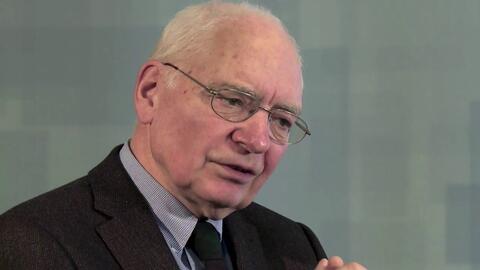
Jens Reich recalls becoming distraught and depressed following this episode. But he managed to create his own sphere of freedom. Instead of persuading biochemistry students to serve as noncommissioned officers, and thus fulfill the political requirements for university studies, he moved in 1968 to the newly founded Computing Center at the Central Institute of Molecular Biology (ZIM) of the GDR Academy of Sciences in Berlin-Buch. Not wishing to be at a constant disadvantage to experimental biochemistry researchers in the West due to a lack of chemicals and technologies, he turned instead to theory and developed mathematical models for the energy metabolism of living cells.
He escaped “dull daily life” in the GDR through science – and, from 1969/70, also through the Freitagskreis (Friday Circle). This was a group of around 30 young intellectuals from a variety of fields who would meet every week to debate culture, philosophy, and literature. These discussions quickly became political in nature and critical of the system. Many Friday Circle members went on to join the opposition.
Thermos flasks of mercury
The Academy of Sciences in Berlin-Buch was a saving grace for many. “There was still some awareness of the outside world,” said Reich. But only the so-called travel cadre had the privilege of presenting and discussing their ideas with the wider world. And as the West was modeling biological systems with ever faster computers and greater storage capability rather than with differential equations, the intellectual bonds between East and West were being wrenched apart. “Our science was reduced to tilling a tame little plot of land. Everyone complained about it and lived with it,” explained Reich. So why did he stay in the GDR? “That’s the kind of person I am. . . . You would have had to drive me away.”
Biochemical lab at the Central Institute for Molecular Biology.
Following his research stays at the Institute of Cell Biophysics of the Russian Academy of Sciences in Pushchino near Moscow in the 1970s, Reich became concerned with the impending economic and ecological collapse of the Soviet Union and the Eastern Bloc. “The valley of the Oka, a huge river, had turned into a dumping ground,” he recounted. “The children would go out to play in the forest and come back with thermos jugs full of mercury – until we found out!” At this time the Aral Sea was gradually drying up, the Soviet army was occupying Afghanistan, and everyone was talking about zinc coffins. “It was obvious that this country was headed for disaster,” he added.
A professional demotion
Reich had close friends within the Soviet Union, but also friendships with people from Hungary, Czechoslovakia, and Poland. These experiences had a strong impact on the family. “Solidarność dissidents stayed at our apartment on their way to the West, for example,” said Reich. He looked for ways to bring about meaningful change and spoke, for example, at the Gethsemane Church in Berlin’s Prenzlauer Berg district about the ecological crisis in the GDR and the militarization of school education. This did not go unnoticed by the Stasi. In 1984, his research group in Buch was dissolved and he was demoted to research assistant. “I was angry that they thought they could discipline me that way. It had the opposite effect. But all the other things, the dissident groups, were more interesting and lively,” he said. Especially when Gorbachev came to power in Moscow in 1985.
More pressing was the fear that Reich’s own family might be breaking apart. One daughter had already left, the other two children were on the same path. “They didn’t want to live like us. So we started thinking about internal reforms,” he said. “The outlook is bleak for any country whose young people are running away.” The first paragraph of the founding manifesto Aufbruch 89 – Neues Forum makes reference to this emigration that gained momentum in the summer of 1989: “In our country communication between state and society is obviously troubled. Proof of this is the widespread dissatisfaction that has led people to retreat into a private niche or to emigrate in large numbers. In other areas of the world such massive flights are the result of deprivation, hunger, and violence. This is by no means the case in our country.” Jens Reich co-authored this manifesto and was one of the first signatories.
Great earnestness and paradoxical exhilaration
His fellow activists Bärbel Bohley and Jutta Seidel took the GDR’s constitution at its word and applied on September 19, 1989, for official recognition under the law governing private associations. The authorities rejected their applications up until November. But the manifesto spread like wildfire and 200,000 people signed it before the year was out. The demand to grant official recognition to the New Forum became one of the rallying cries at the nationwide protests.
On November 4, 1989, Jens Reich stood on a truck bed on Alexanderplatz as a speaker for the New Forum and looked uneasily out at the restive mass of people. While the October 7 demonstration in Berlin had ended with knocked-out teeth and numerous arrests, there had occurred on October 9 the “miracle of Leipzig” ‒ the huge demonstration concluded peacefully without government interference. “That was a signal that there would not be a Tiananmen Square incident,” said Reich. Practically everyone in Berlin who could walk was afoot, and hundreds of thousands joined the demonstration. “The people were not afraid at all,” he continued. ‟Along the edge of the road a group of mimes even acted the role of the Politburo and waved their hands in the fashion of gerontocratic leaders. My family said this caused everyone to laugh hysterically.”
That was a big day. Although it was the swan song to the GDR.
But he did not initially notice the cheerful atmosphere, because he was giving a speech that called for genuine democratic dialogue, freedom of the media, and free elections and that warned against timidity. “At the front stood undercover Stasi operatives,” said Reich. “They gave us a nasty heckling and made you feel as though something was weighing heavily on your heart.” When he later mingled among the crowd and saw what the people had – with great earnestness and paradoxical exhilaration ‒ made of this demonstration, he experienced it as a freeing step toward the future. “That was a momentous day,” said Reich, “even though it was the swan song of the GDR.”
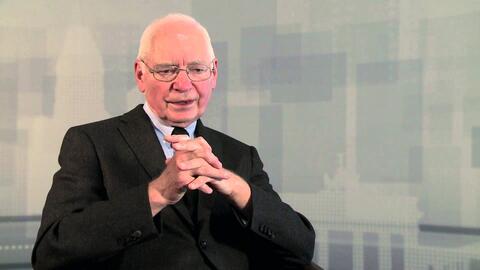
The decoding of the human genomes
The 1989 revolution was the second life-altering experience for Jens Reich. He assisted in preparations for German reunification as a member of the Alliance 90/The Greens group in the GDR’s only freely elected parliament. After a year he withdrew from politics – apart from when he stood as an independent candidate for president of Germany – and returned to the world of research, where he helped shape another revolution: the decoding of human DNA as part of the Human Genome Project. He also tackled the bioethical issues related to this undertaking as a member of the German Ethics Council from 2001 to 2012.
At the Max Delbrück Center for Molecular Medicine (MDC), he headed a medical genome research group from 1992 until his retirement in 2004. The Buch campus and the MDC formed the center of his entire professional life. He witnessed the transformation – from a closed community where positions were permanent, groups usually grew old together, and gossip thrived to a scientific system that was above all oriented to the outside world and that offered young researchers little security. “They lead the life of a water flea so as not to get left behind,” said Reich. “Water fleas sink when they stop moving, then they struggle to climb up again.”
Even today one sees Jens Reich striding across campus several times a week with thick file folders and books under his arms. He is involved in the MDC’s animal welfare efforts and encourages debate on bioethical issues such as genome editing using CRISPR-Cas9. “I find myself repeatedly concerned about intervening in the genomic makeup of unborn beings,” Reich said, adding: ‟The media portrays the issue as a dystopian fantasy, but what if we were able to extend life through genetic surgery? If we could make anopheles mosquitoes stop biting humans? What would this world look like? How dangerous is it? But, also, how wonderful!” In his opinion, one can’t just leave this conversation to others; biomedical researchers should instead be engaged and go into the outside world to debate these issues. “We need forward thinkers!” Reich said. “But I understand that time constraints and the pressure to publish might lead to tunnel vision.”
He still serves as the MDC’s Research Ombudsman to this day, providing guidance and advice when conflicts arise. “His integrity, clear analyses, and basic humanity set an example for all MDC employees,” said Professor Martin Lohse, Scientific Director of the MDC. “We particularly value his rigorous reflections and are thankful that he continues to advise the MDC on ethical issues. We wish him all the very best on his 80th birthday.”
